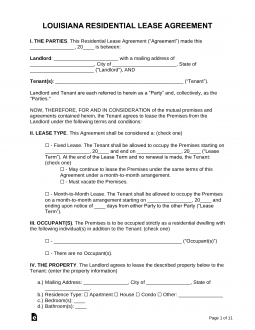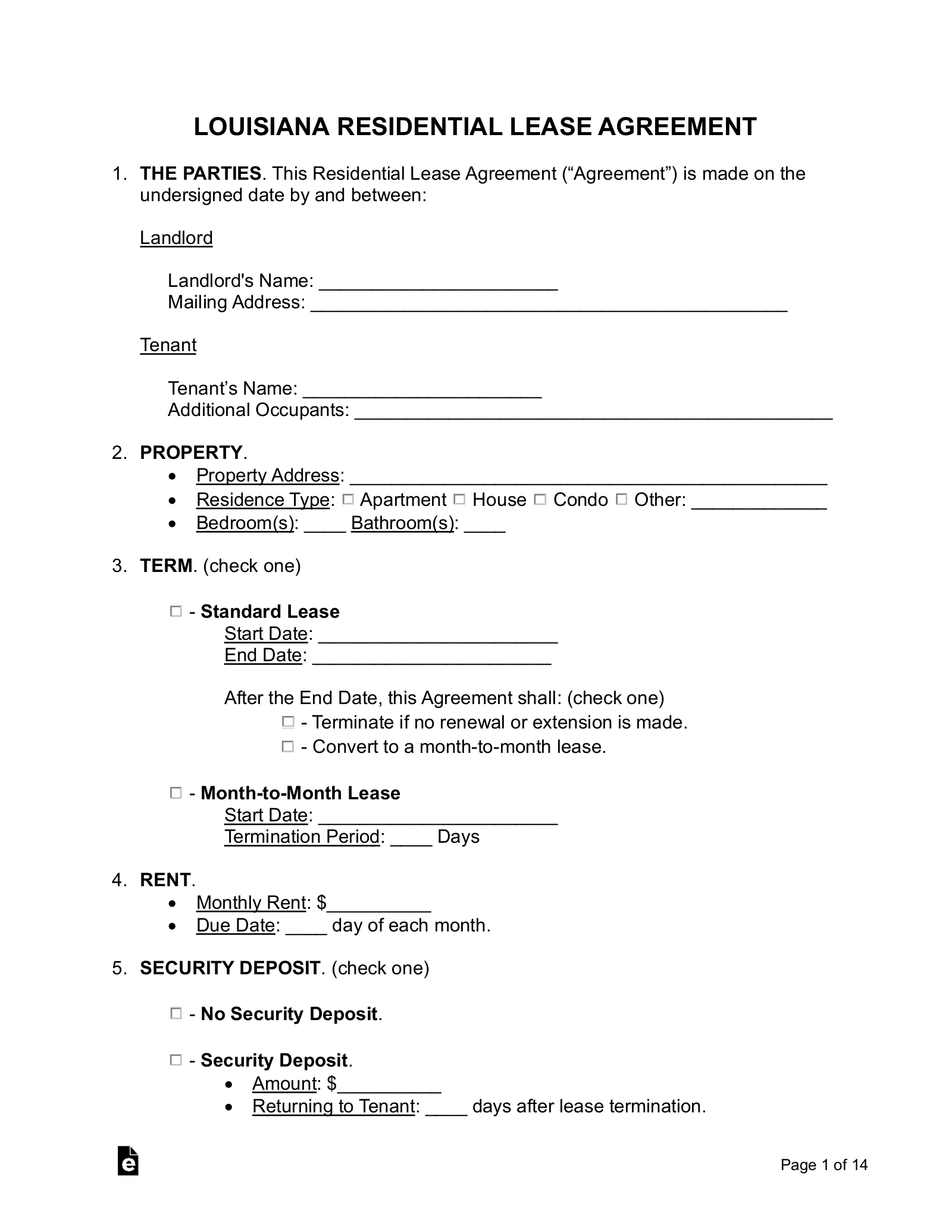Updated November 21, 2023
A Louisiana rental agreement is between a landlord and tenant for the rental and use of a residential or commercial property. The tenant will agree to maintain the property and pay rent on a monthly basis to the landlord. The landlord is recommended, before authorizing a lease, to run a credit check on the tenant and verify their income through their employer or past pay stubs.
Table of Contents |
Agreement Types (7)
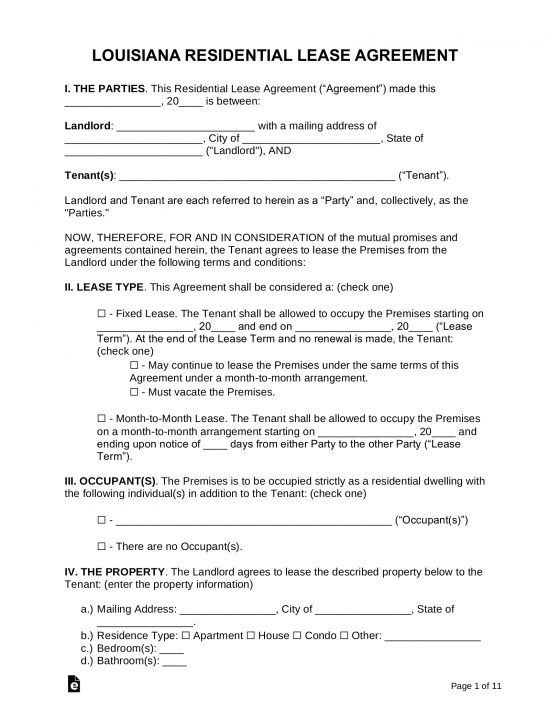 Standard Residential Lease Agreement – Landlord and tenant arrangement with a fixed start and end date. Standard Residential Lease Agreement – Landlord and tenant arrangement with a fixed start and end date.
Download: PDF, MS Word, OpenDocument |
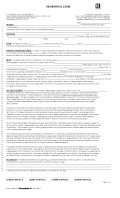 Association of Realtors Lease Agreement – Provided by the New Orleans Metropolitan Association of Realtors for the use of residential tenancies. Association of Realtors Lease Agreement – Provided by the New Orleans Metropolitan Association of Realtors for the use of residential tenancies.
Download: PDF |
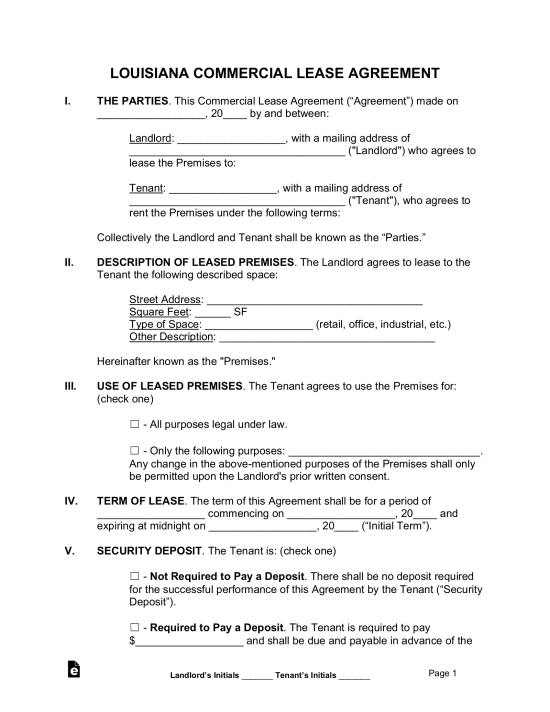 Commercial Lease Agreement – Used for a property that has an office, retail, industrial, or any other type of space that may be available for a business to operate. Commercial Lease Agreement – Used for a property that has an office, retail, industrial, or any other type of space that may be available for a business to operate.
Download: PDF, MS Word, OpenDocument |
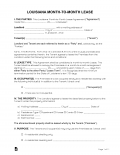 Month-to-Month Lease Agreement (CC 2728) – Has a start date and no end period. The tenancy ends when either the landlord or tenant gives the other party 10 days’ notice before the next payment date. Month-to-Month Lease Agreement (CC 2728) – Has a start date and no end period. The tenancy ends when either the landlord or tenant gives the other party 10 days’ notice before the next payment date.
Download: PDF, MS Word, OpenDocument |
 Rent-to-Own Lease Agreement – Standard rental contract that gives the tenant the power to buy the premises with an option listed in the document. Rent-to-Own Lease Agreement – Standard rental contract that gives the tenant the power to buy the premises with an option listed in the document.
Download: PDF, MS Word, OpenDocument |
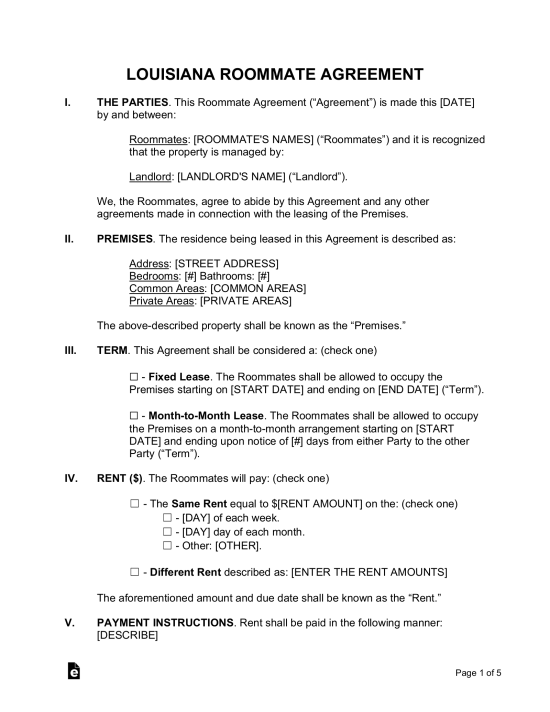 Room Rental (Roommate) Agreement – A written consensus among persons living in a shared housing arrangement. Room Rental (Roommate) Agreement – A written consensus among persons living in a shared housing arrangement.
Download: PDF, MS Word, OpenDocument |
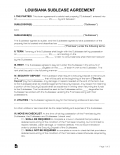 Sublease Agreement – Form for a tenant who wants to rent the space they are under contract for to someone else, known as the “subtenant.” Sublease Agreement – Form for a tenant who wants to rent the space they are under contract for to someone else, known as the “subtenant.”
Download: PDF, MS Word, OpenDocument |
Required Disclosures (1)
Security Deposits
Maximum Amount – There is no maximum set by Louisiana state law. The landlord may request any amount from the tenant.
Collecting Interest – Louisiana state law does not require landlords to provide interest on held security deposits.
Returning – The landlord has one month from the tenancy end date to return the funds to the tenant.[1] If the landlord does not return the deposit within one month, the landlord will be subject to a penalty of $300 or twice the amount of the deposit, whichever is greater.[2]
- Itemized List – If any portion of the security deposit is retained to cover the costs of damages or remedy a default of the tenant, the landlord must provide an itemized statement explaining the reasons for the retained amount within one month of the tenancy end date.[1]
When is Rent Due?
Grace Period – Louisiana state law does not require landlords to provide a grace period for the late payment of rent. Rent is due on the date mentioned in the lease. If rent is not paid on time, the landlord can charge a fee and serve a five-day notice to quit.
Maximum Late Fee – There is no maximum penalty set by Louisiana state law. The landlord can charge as much as desired, as long as it is mentioned in the lease.
NSF Fee – $25 or 5% of the check amount, whichever is greater, can be charged to the tenant for a bad check.[3]
Withholding Rent – If the landlord fails to make necessary repairs to the unit in a reasonable amount of time, then the tenant can make these repairs and apply the costs of the repairs to their next rent payment.[4]
Right to Enter (Landlord)
The landlord is not required by Louisiana state law to give advance notice to the tenant before entering the property. However, it is recommended that the landlord give 24- to 48-hours’ notice as a courtesy.
Abandonment
Absence – Louisiana state law does not specify an amount of time that must pass before a rental property is considered abandoned. Premises may be presumed to be abandoned if residential occupation has ceased, the keys have been returned, or furniture and other movables have been removed.[5]
Breaking the Lease – Louisiana state law allows military personnel to terminate a lease early if they are required to relocate.[6] Victims of sexual assault or domestic abuse also have the right to terminate a lease under certain circumstances.[7][8]
Tenant’s Utility Shutoff – If the tenant violates the lease agreement by failing to pay for utilities, then the landlord may obtain the dissolution of the lease.[9]
Unclaimed Property – Louisiana state law does not require landlords to store or otherwise hold unclaimed personal property after a tenant has vacated a rental property.

